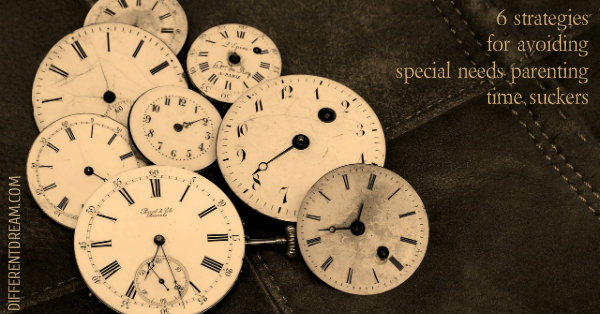Special Needs Parenting Time Suckers and How To Avoid Them

Special needs parenting time suckers can drain caregivers of energy, motivation, and time with typically developing children. Guest blogger Kimberly Drew is here with 6 strategies she uses to neutralize them so she can spend her time building relationships with all the children in her family.
Special Needs Parenting Time Suckers and How To Avoid Them
Special needs parenting time suckers are one of the greatest challenges in my life as a caregiver. For instance, my daughter’s diaper leaked all over the floor this evening. When I was supposed to be helping my son with homework I spent twenty minutes cleaning the mess and bathing my daughter. More distressing are medical emergencies and illnesses, but all of them are exhausting and unwelcome interruptions that start to add up.
The time required to physically, intellectually, and emotionally to care for a child—going to appointments, financial planning for medical expenses, bathing, feeding, and managing a child’s emotions if the disability has a behavioral component—is a huge challenge. My life has become one of service to my daughters with special needs. This is no small calling requiring an enormous amount of time to do it well. Without my care my daughters would die. Even so, there must be a healthy balance between caring for a disabled child and caring for typically-developing children. Each child entrusted to us is a gift from God and deserves our time. Here are 6 strategies I keep in mind to avoid falling into the trap of special needs parenting time suckers that take away time from my other children.
Strategy #1
A promise is a promise, so avoid making promises to spend time with a child and then cancel because daily routines are making you tired. A medical emergency falls into a different category that requires your family to be flexible, but normal routines aren’t an excuse to bail.
Strategy #2
Make arrangements for someone else to care for your child with special needs so you can have one on one time with your typically-developing children. An hour here and there can create memories that mean something.
Strategy #3
Make sure at least one parent is at your children’s sporting or hobby events. We don’t want our kids to look back and say, “Mom never came to my basketball games because she was always with my brother.” Sharing the load with your spouse or another close family member makes a difference.
Strategy #4
Don’t allow gifts, money, or anything else become a substitute for your presence in a child’s life. A child’s character is shaped by the challenges that accompany having a sibling with disabilities. Don’t compromise the shaping of character by throwing gifts at a child, and don’t sabotage it through neglect.
Strategy #5
Quality time may not require equal time. The quality of time spent with typical siblings may not add up to the same number of hours spent with a child who has disabilities. But it may feel like the same amount of time to both children, and that’s what matters.
Strategy #6
Parents make intentional plans for their child with disabilities–meds, appointments, baths, transportation, and more. Plan intentionally for typical children too. Make sure to put their names and activities on your calendar.
Do you like what you see at DifferentDream.com? You can receive more great content by subscribing to the quarterly Different Dream newsletter and signing up for the daily RSS feed delivered to your email inbox. You can sign up for the first in the pop up box and the second at the bottom of this page.

By Kimberly Drew
Kimberly grew up and went to college in the small town of Upland, IN. She graduated from Taylor University with a degree in Elementary Education in 2002. While at TU, she married her college sweetheart and so began their adventure! Ryan and Kimberly have three amazing kids on earth (Abigail, Jayden, and Cooper), and a baby boy waiting for them in heaven. Their daughter Abigail (Abbey) has multiple disabilities including cerebral palsy, a seizure disorder, hearing loss, microcephaly, and oral dysphagia. She is the inspiration behind Kimberly’s desire to write. In addition to being a stay at home mom, Kimberly has been serving alongside her husband in full time youth ministry for almost fourteen years. She enjoys working with the senior high girls, scrapbooking, reading, and music. You can visit Kimberly at her website, Promises and Perspective.
3 Comments
Submit a Comment
Subscribe for Updates from Jolene
Related Posts
The Lessons I Learned while Raising a Child with EA/TEF
Jolene Philo reflects on a lifetime of lessons learned while raising a child with EA/TEF and shares the insights she’s won.
Looking Back at Your Child’s EA/TEF Journey
Looking back at your child’s EA/TEF journey can give parents a new perspective about past events. Guest blogger Maggi Gale shares how her look back clearly showed her how God was with their family during their daughter’s very unusual first weeks of life in 2002. Three...
How Do I Let Go of My Adult EA/TEF Child?
Valeria Conshafter explores the question “How do I let go of my adult EA/TEF child?” for EA/TEF Awareness Month.






I’m glad you found them helpful, Wrae!
It can get so difficult to set aside time for everyone else that needs you. These tips are great.
Kimberly this is such a delicate line to walk with our children as we all want them to understand that we love them all equally. We have two children 7 years apart and our youngest has special needs so our oldest was quite aware of many of the challenges (even though she did not always understand). We were very diligent with her activities and tried not to miss any events and we would take extra time to ensure she had her needs met. The intentional planning is a must!!